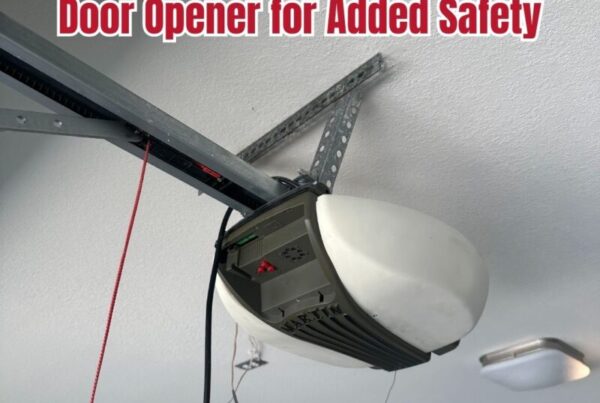
Garage Door Spring Maintenance: Simple Tips for Longevity

Garage Door Spring Maintenance: Tips for Avoiding Costly Repairs
Is your garage door making strange noises or struggling to open? Faulty springs might be the culprit. This guide will teach you how to maintain your garage door springs and spot early signs of wear. You’ll learn simple maintenance tips and when to call a professional, helping you avoid costly repairs and keep your garage door working smoothly. By the end, you’ll know how to extend the life of your springs and ensure your garage door operates safely.
Understanding Garage Door Spring Maintenance

Regular maintenance of your garage door springs is crucial for their longevity and performance. Understanding the impact of humidity and dust on spring life expectancy can help you prevent costly repairs. Learn to spot signs that your springs need attention, and when it’s time to call a technician. By staying proactive, you can avoid unexpected spring breaks and keep your garage door functioning smoothly.
The Importance of Regular Maintenance
Regular maintenance is key to extending the longevity of your garage door springs and preventing costly repairs. By keeping your springs clean and properly greased, you can reduce wear and tear, minimizing the risk of a garage spring snapping unexpectedly. Your maintenance routine should include periodic checks and lubrication to ensure smooth operation. Here’s what you should do:
- Inspect springs for signs of rust or damage
- Clean springs to remove dust and debris
- Apply appropriate lubricant to moving parts
- Test door balance and spring tension
- Schedule professional maintenance annually
Signs That Springs Need Attention
Your garage door springs may need attention if you notice certain warning signs. Watch for uneven movement or sagging when you open or close the door, as this can indicate a failing torsion spring. Listen for unusual noises like squeaking or grinding, which might suggest your springs need lubrication or replacement. If your door feels heavier than usual or doesn’t stay open, it’s time to call for garage door repairs. Spotting these issues early can help you avoid complete spring failure and costly garage door replacement.
Tips for Effective Garage Door Spring Maintenance

Keep your garage door springs in top shape with these easy maintenance tips. Regularly inspect and tighten hardware to prevent loosening. Lubricate springs to reduce friction and wear. Watch for signs of wear to catch issues early. These simple steps can help you avoid costly repairs and keep your garage door running smoothly, whether you’re in Dallas or dealing with torsion springs, lithiumgrease, or windows.
Inspect and Tighten Hardware Regularly
Regular inspections and hardware tightening are crucial for garage door spring maintenance. Check your springs, cables, and other hardware for signs of wear or damage during your inspection. Tighten any loose bolts or screws to prevent additional stress on your garage springs. This simple step can help you avoid a garage spring broken situation and extend the life of your system. Remember, weather can affect your door‘s weight and performance, so adjust your maintenance schedule accordingly:
- Inspect springs for rust or corrosion
- Tighten all visible hardware
- Check cable tension
- Adjust spring tension if necessary
- Clean and lubricate moving parts
Keep Springs Lubricated
Keep your garage door springs well-lubricated to prevent broken garage door springs and reduce friction. Apply a high-quality lubricant to the steel springs regularly, especially after exposure to water damage or during humid weather. This simple step helps prevent rust and extends the life of your springs, saving you from costly repairs down the line. Remember, proper lubrication keeps your garage door operating smoothly and quietly.
Monitor for Signs of Wear
Keep an eye out for signs of wear on your garage door spring to prevent unexpected failures. Check for rust, gaps in the coils, or visible damage to the spring. Listen for unusual noises when operating your door, as these can indicate worn springs affecting torque. Inspect windows for condensation, which might lead to increased humidity and faster spring deterioration. Use silicone-based lubricants to maintain spring efficiency and conserve energy. Regular monitoring helps you catch issues early, saving you from costly repairs:
- Look for rust or corrosion on springs
- Check for gaps or visible damage in coils
- Listen for unusual noises during operation
- Inspect windows for signs of moisture
- Apply silicone-based lubricants as needed
How to Identify a Broken Garage Door Spring

Spotting a broken garage door spring early can save you from costly repairs and potential safety risks. Learn to recognize the symptoms, such as unusual noises or a door that won’t open. Don’t ignore these signs, as they can lead to more serious issues. Regular checks, including inspecting silicon-based lubricants and the ceiling for damage, can help you maintain your garage door‘s frequency of use without increasing the risk of failure.
Recognizing Symptoms of a Broken Spring
You can spot a broken garage door spring by paying attention to key symptoms. Listen for unusual noises when opening or closing your door, as this often signals a spring issue. If your door feels heavy or won’t open at all, you might need a garage door fix. Check for gaps in the spring coils or visible damage. These signs indicate it’s time to email a professional or grab your socket wrench for repairs. Remember, addressing spring problems promptly can prevent wood damage to your door and ensure smooth operation.
- Listen for strange noises during operation
- Check if the door feels heavier than usual
- Look for visible gaps or damage in spring coils
- Test if the door opens and closes properly
- Inspect for any wood damage around the door
Consequences of Ignoring a Broken Spring
Ignoring a broken garage door spring can lead to serious consequences for your overhead door system. You risk damaging other components, like the motor or cables, which could result in more expensive garage door repair phoenix services. A broken torsion spring can cause your door to fall unexpectedly, posing safety hazards. Don’t let spring fatigue go unchecked; it’s not something you can fix with motor oil. Call a professional promptly to avoid these risks and keep your garage door functioning safely.
Torsion Spring Lifespan and Maintenance

Understanding your garage door‘s torsion springs can help you avoid costly repairs. Learn what affects their lifespan and how to extend it. We’ll cover factors like usage frequency and environmental conditions that impact spring durability. You’ll also get practical tips on maintenance, including proper lubrication and when to call for professional help. With these insights, you can keep your garage door running smoothly and safely.
Factors Influencing Torsion Spring Lifespan
Your garage door‘s torsion spring lifespan depends on several factors. The stress placed on the springs from frequent use can shorten their life. Quality of the spring’s coating affects its resistance to rust and wear. Environmental conditions in your garage, like humidity and temperature fluctuations, also play a role. To extend your spring’s life and avoid needing a replacement garage door, consider these key factors:
- Frequency of garage door use
- Quality of spring materials and coating
- Exposure to moisture and temperature changes
- Regular maintenance and lubrication
- Proper installation and tension adjustment
How to Extend the Life of Your Torsion Springs
You can extend the life of your torsion springs by following a few simple steps. Regularly lubricate the springs with a silicone-based lubricant to prevent corrosion and reduce friction. Check for any signs of wear or damage, such as gaps in the coils or rust, and address them promptly to avoid a hazard. If you notice any issues with your overhead door spring, don’t attempt to repair it yourself—call a professional for overhead door spring repair. This can help you avoid the need to replace your garage door prematurely and ensure your safety:
- Apply silicone-based lubricant regularly
- Inspect springs for wear and damage
- Tighten any loose screws or bolts
- Maintain proper balance and tension
- Schedule professional inspections annually
Professional Help for Garage Door Spring Issues

When it comes to garage door spring issues in the United States, knowing when to call a professional is crucial. Regular maintenance, including proper oiling and protection from moisture, can help prevent costly repairs. However, some tasks are best left to experts. Learn about the benefits of professional maintenance and repair, including proper weatherstripping installation, to keep your garage door functioning smoothly.
When to Call a Professional
You should call a professional for emergency service if you notice a broken spring on your garage door or if you’re dealing with water damage. Attempting to fix a broken spring garage yourself can lead to serious injury. If your door won’t open or close properly, it’s time to contact an expert. Remember, your safety comes first when handling garage door issues.
Benefits of Professional Maintenance and Repair
You’ll gain numerous benefits from professional garage doormaintenance and repair. A technician can spot issues like worn paint, faulty sensors, or loose nuts before they become major problems. They’ll clean away dirt and debris that can affect your door‘s performance. By having experts handle these tasks, you ensure your garage door operates smoothly and safely, potentially saving you from costly repairs down the line.
Frequently Asked Questions About Garage Door Springs

Curious about garage door springs? Let’s tackle common issues and prevention tips. You’ll learn about problems like spring length changes, bearingwear, and how climate affects metalwire. Discover practical ways to prevent future breakage and extend your springs’ lifespan. These insights will help you maintain your garage door and avoid unexpected repairs.
What Are Common Problems With Garage Door Springs?
You might encounter several common problems with your garage door springs. Debris buildup can cause wear and tear, leading to broken spring repair needs. Temperature fluctuations can affect spring tension, potentially requiring garage spring repair. You’ll also want to watch for signs of rust or corrosion, which can weaken the springs over time. Regular cleaning and lubrication can help prevent these issues and extend your springs’ lifespan.
How Can I Prevent Future Spring Breakage?
You can prevent future spring breakage by maintaining your garage door regularly. Keep the springs clean and lubricated, using a silicone-based spray to reduce friction and wear. Check for signs of rust or damage during your routine inspections. If you notice any issues, call a professional for help. Remember, proper maintenance can save you from unexpected repairs and keep your garage door running smoothly.
Conclusion
Regular garage door spring maintenance is crucial for preventing costly repairs and ensuring smooth operation. By inspecting hardware, keeping springs lubricated, and monitoring for signs of wear, you can extend the lifespan of your garage door system. Recognizing symptoms of broken springs early and seeking professional help when needed can save you from safety hazards and more extensive damage. Investing time in proper maintenance and understanding when to call experts will keep your garage door functioning reliably, protecting your investment and ensuring your family’s safety.




